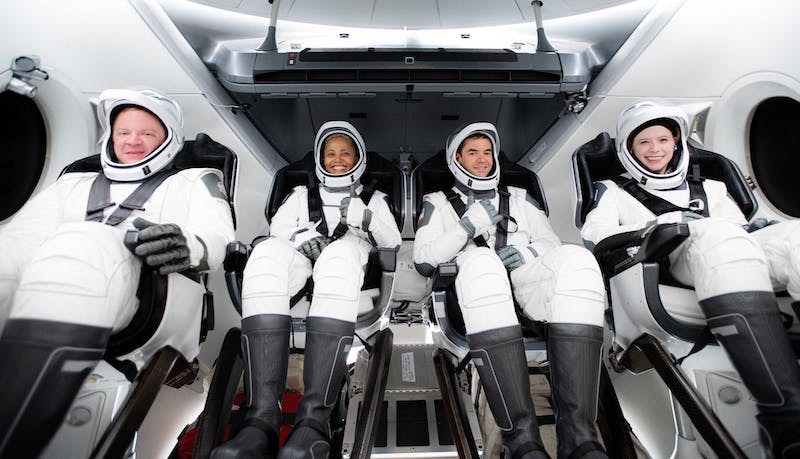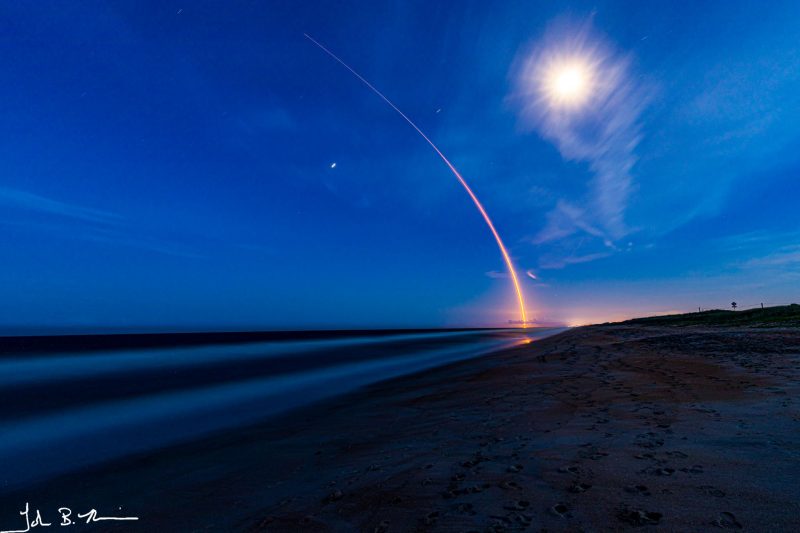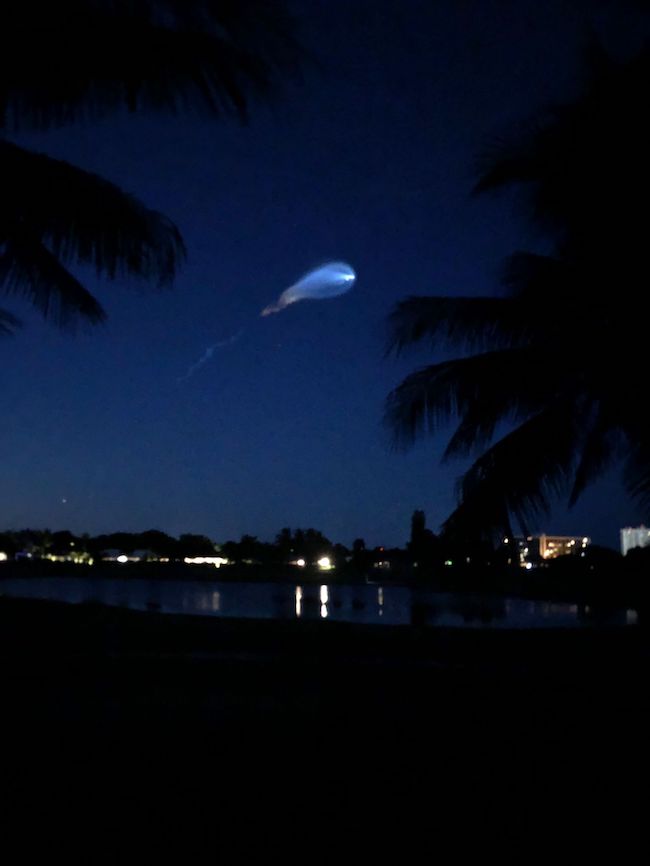Liftoff! Civilians make history
SpaceX made history yesterday as it successfully launched Inspiration4, dubbed the world’s first all-civilian mission by the private spaceflight company. The Falcon 9 rocket blasted off from Pad 39A at NASA’s Kennedy Space Center in Florida at 00:02 UTC (8:02 p.m. EDT) on September 15, 2021. At its head was a Crew Dragon spacecraft, where four civilians sat strapped inside and prepared for the ride of their lives. Inspiration4 is an entrance into what SpaceX hopes will be a new era of space: one where everyday people, like the crew of Inspiration4, can visit space.
The Dragon used in this mission – named Resilience by the Crew-1 astronauts – will carry the Inspiration4 crew on a trajectory high around Earth. They will travel to an altitude of 357 miles (575 km), even higher than both the International Space Station (ISS) and the Hubble Space Telescope.
They’ll spend about three days in their spacecraft as they orbit the planet, and are currently estimated to splash down sometime by Sunday (September 19) at the latest. However, Jared Isaacman, who serves as commander of the crew, said that the Dragon can host the crew for as much as a week in space if poor weather or other issues arise.
A large dome window called a cupola will treat the crew to views of the Earth while they orbit the planet, witnessing approximately 15 sunrises and sunsets per day.
Isaacman was heard from inside the spacecraft during SpaceX’s livestream, saying:
Few have come before, and many are about to follow. The door is now open, and it’s pretty incredible.
Inspiration4-a-cause
Isaacman, the founder and CEO of Shift4 Payments, is largely responsible for the mission’s planning from birth to launch. SpaceX announced in February that (for an undisclosed price) he purchased a Dragon flight to raise money and awareness for St. Jude Children’s Research Hospital. As Inspiration4 commander, his mission objective is to inspire humanity while raising money for children’s cancer research.
Isaacman said that the first seat would go to a frontline worker. And on February 22, Hayley Arceneaux was named that lucky winner. Not only is she a childhood cancer survivor and former patient at St. Jude, but she’s also a physician’s assistant working for the organization that saved her life. When Inspiration4 took flight yesterday, she became the youngest American to fly in space and the first to do so with a partially prosthetic limb.
The second seat sold as part of a televised auction that raised $13 million for St. Jude. That bidder remains unnamed and did not fly. Instead, the bidder generously gave the prize to their friend Christopher Sembroski, a professional data engineer and Air Force veteran.
The final seat was up for grabs as part of a contest in which American entrepreneurs could devise a business to earn donations for St. Jude. Sian Proctor, a geoscientist and professor at Southern Mountain Community College in Phoenix, Arizona, was ultimately selected due to her art and poetry. Proctor said she plans to spend time sitting in the cupola with the view of Earth below, using it as a muse for new poetry she plans to write during the flight.
Proctor’s father worked on the Apollo moon program for NASA, which inspired her to pursue the astronaut occupation later in life. She was a finalist in NASA’s selection process of 1999 but did not see it to fruition. Now more than two decades later, she is living her dream.

Isaacman said in a St. Jude statement:
To crew members who will be selected to represent the mission pillars of leadership, hope, generosity, and prosperity. Inspiration4 is the realization of a lifelong dream and a step towards a future in which anyone can venture out and explore the stars. I appreciate the tremendous responsibility that comes with commanding this mission, and I want to use this historic moment to inspire humanity while helping to tackle childhood cancer here on Earth.
Inspiration4 training
The crew went through a mild training program, compared to the one professional astronauts regularly endure. It included many hours in a Crew Dragon simulator, survival training on Mount Rainier, and multiple flights in fighter jets. The crew also practiced how to handle various emergencies in orbit.
Isaacman stated in a news conference earlier this week (September 14):
We want to make life multi-planetary, and that means putting millions of people in space one day. So, as we look for ways to evolve toward that airline-like model, we’ll look for how we can, you know, cut back on the amount of training that’s necessary while still keeping the crew safe.
Historically, astronauts have been in tip-top, peak physical shape to survive the demanding rigors of spaceflight. Inspiration4 will offer a way to gather data from more ordinary physiques. According to Space.com, Arceneaux says that half of the crew will monitor blood glucose levels in space. Those could one day lead to advancements in diabetes and pave the way to support astronauts and other space travelers who depend on insulin.
SpaceX president Gwynne Shotwell said in a statement:
The all-civilian Inspiration4 astronauts are paving the way for a future where space is more accessible to all who wish to go, and we are so proud that they entrusted us to fly them.

Crew Dragon recovery
Isaacman, Arceneaux, Sembroski, and Proctor are the fourth crew to ride in a Dragon capsule built by SpaceX to loft humans to and from the ISS like an astronaut taxi. The California company has always striven for more sustainable space travel and has long been reusing its Falcon 9 rockets rather than investing in traditional rockets.
Less than ten minutes after liftoff, the booster featured in yesterday’s flight was back on Earth. It landed on the deck of one of SpaceX’s drone ships, Just Read the Instructions, sticking the company’s 92nd successful landing. Once it arrives back in port, it will be refurbished and, likely, will fly again for a fourth flight in the future.
Godspeed, Inspiration4!

Bottom line: SpaceX made history as it successfully launched Inspiration4, called “the world’s first all-civilian mission” by SpaceX. The Falcon 9 rocket blasted off from Kennedy Space Center on September 15, 2021. The four civilians strapped inside a Crew Dragon spacecraft experienced the ride of their lives. It’s an entrance into what SpaceX hopes will be a new era of space: one where everyday people can visit space.
The post Inspiration4: 1st all-civilian crew goes to space first appeared on EarthSky.
0 Commentaires